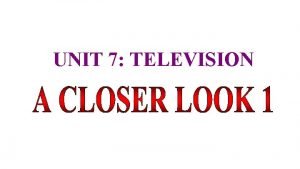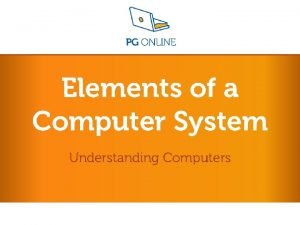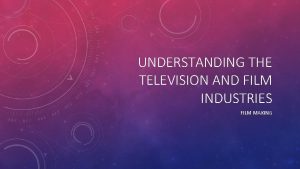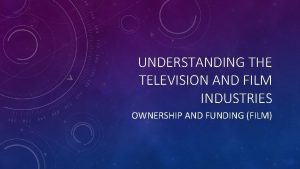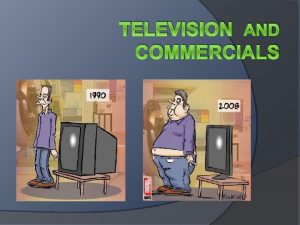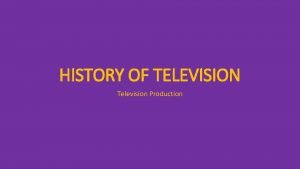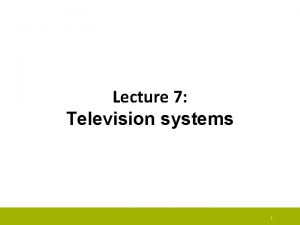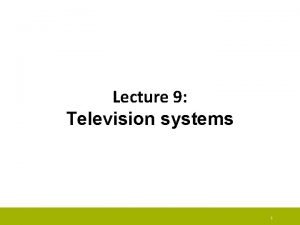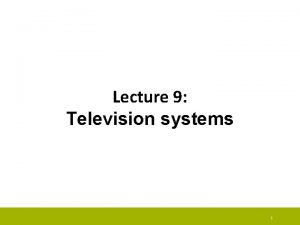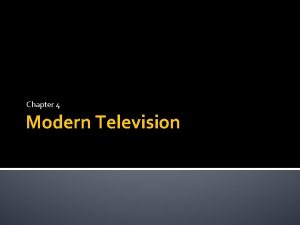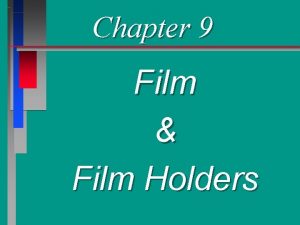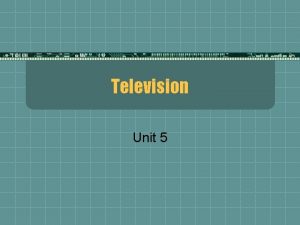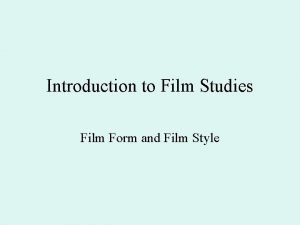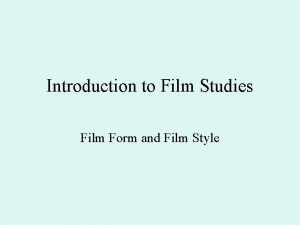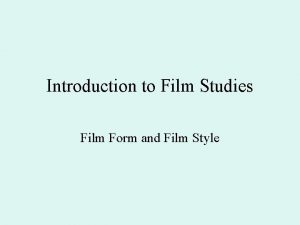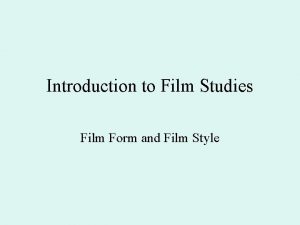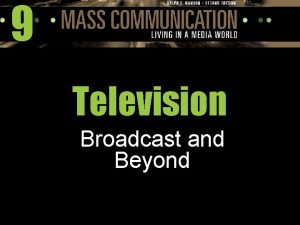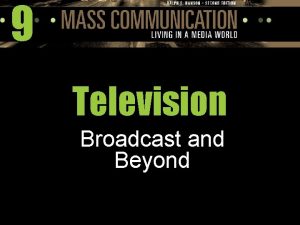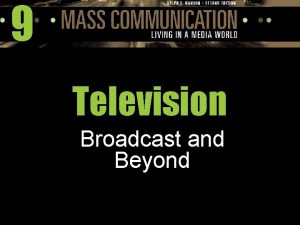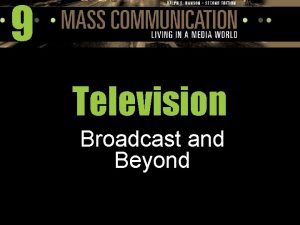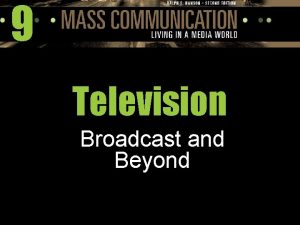UNIT 8 UNDERSTANDING THE TELEVISION AND FILM INDUSTRIES



































- Slides: 35

UNIT 8: UNDERSTANDING THE TELEVISION AND FILM INDUSTRIES LIMITATIONS AND OBLIGATIONS

We will be looking at contractual, legal and ethical obligations in the television and film industries.

Contracts The media industry is different to any other industry when it comes to contracts. Being a ever changing industry, contracts need to be flexible to accommodate this.

• Full Time (Permanent) • Part Time (Permanent) • Fixed Term and Freelance • Shift Work • Office Hours • Irregular and Anti-Social Hours Pay • Salaried • On Completion

All contracts will contain some fine print, the media industry is a prime example, confidentiality and exclusivity clauses are common in the film and television industry. • Confidentiality • Exclusivity

Confidentiality A confidentiality contract is where you will sign to agree that you will not discuss or revel any details of the project or production you are working on to anybody who is not involved. This is the companies privacy protection.

Exclusivity An exclusivity contract is when two separate parties agree to work together exclusively for a certain period of time. This can refer to workers, content and rights. This prohibits any of the involved parties from working with anyone else for the duration of the contract.

A person only for one company, be that low level, high level creative, actor, producer etc. Two companies agreeing on the use of content exclusively, such as Amazon having the exclusive rights to Viacom material, Netflix to cartoon network etc. Also signing deals with specific film studios to show their movies as well. (This is known as a second pay window deal). The rights related to a specific product such as literature, films and other creative property. So only that company can produce using that content. E. g. Sony owning exclusive rights to Spider-man and Fox owning rights to X-Men both of which are originally Marvel's property.

Employment Legislation is a set of laws and rights that both employers and employees must follow in the workplace. They are health and safety, equal opportunities, employment equality regulations, employer's liability, employee rights, trade unions, intellectual property, copyright, trademarks and passing off. Legislation covers most of the ethical and legal areas of the T. V. and film industry.

Health and Safety Employers are responsible for the health, safety and wellbeing of their employees at work. People may be injured at work or ill from something related to working under a company. If they believe the employer is to blame they may seek compensation. The Employer's Liability (Compulsory Insurance) Act 1969 insures a minimum level of insurance against such claims and is written into employee contracts.

Equal Opportunities Employers must look to provide equal opportunities for all potential and current employees. They must aim to recruit fairly and look to produce codes of practice that comply with the Equality Act 2010. An example from the BBFC website reads: The BBFC is committed to the development and expansion of positive policies to promote equal opportunities in life regardless of individuals’ gender, marital status, creed, colour, race, ethnic origin, religious or political beliefs, sexual orientation, disability or age. The BBFC aims to ensure that no job applicant or employee is placed at a disadvantage by requirements or conditions which would have disproportionally adverse effects on him or her. Entry into employment within the Board and progression within it will be determined solely by the application of objective criteria, personal performance and merit.

Employment Equality Discrimination on the grounds of race, gender, age is illegal. This is a consideration in employment of staff, cast and crew and also the depiction of individuals on screen. The Equality Act 2010 replaced: • Equal Pay Act 1970 • Sex Discrimination Act 1975 • Race Relations Act 1976 • Disabliity Discrimination Act 1995 • Employment Equality (Religion of Belief) Regulations 2003 • Employment Equality (Sexual Orientation) 2005 • Employment Equality (Age) Regulations 2006

Countryfile presenter Miriam O' Reilly was awarded 150 k after being sacked by the BBC in 2011. She won her case on the grounds of ageism and victimisation complaints (Her claim of sexism was turned down).

Employer's Liability Your employer is responsible for your health and safety while you are at work. If you are injured as a result of an accident at work, or become ill as a result of your work, and if you believe your employer is responsible, you may be able to seek compensation from them. The Employers’ Liability (Compulsory Insurance) Act 1969 requires your employer to have at least a minimum level of insurance against any such claims. Public liability insurance is different. It covers employers for claims made against them by members of the public or other businesses, but not for claims by employees. While public liability insurance is generally voluntary, employers’ liability insurance is compulsory. Your employer can be fined if they do not hold a current employers’ liability insurance policy which complies with the law.

Employee Rights All employees are given equal rights and opportunities in the workplace. • Work Rights: What they are intitled to in working hours. • Main terms and conditions: Overall restrictions and obligations meant for each employee. • Wages. • Holidays and holiday pay. • Lay offs and short time working: Contractual hours and terms, meant for time changes. • Sickness. • Time off. • The right for training. • The right for flexible hours. • Health and safety: Legal terms and insurance policies. • Harassment and discrimination • Bullying. • Trade unions. • Notice regulations. • References.

Trade Unions exist to protect the rights and interests of workers. To receive the benefits you have to be a member the BECTU is the leading trade union for the media industry in the U. K. its membership for new freelance members is £ 120 yearly. BECTU provides a wide range of services to its circa 25, 000 members, including: • Negotiating pay, conditions and contracts with employers • Personal advice and representation for individual members • Advice and representation on health and safety • Benfits and services for BECTU members • Training support and courses • Networking events and career development opportunities • Union journal, Stage Screen and Radio, published six times a year. • Website designed to improve access to the union's advice and support.

Intellectual Property refers to creations of the mind for which exclusive rights are recognised. Owners have exclusive rights to a variety of intangible assests (non-monetary asset, with no physical substance). Musical, literary, and artistic works; discoveries and inventions; and words, phrases, symbols, and designs. Common types of intellectual property in the media include, copyright and trademarks.

Copyright • literary works, including novels, instruction manuals, computer programs, song lyrics, newspaper articles and some types of database. • dramatic works, including dance or mime. • musical works. • artistic works, including paintings, engravings, photographs, sculptures, collages, architecture, technical drawings, diagrams, maps and logos. • layouts or typographical arrangements used to publish a work, for a book for instance. • recordings of a work, including sound and film • broadcasts of a work.

Copyright protects the physical expression of ideas. As soon as an idea is given physical form, e. g. a piece of writing, a photograph, music, a film, a web page, it is protected by copyright. There is no need for registration or to claim copyright in some way, protection is automatic at the point of creation. Both published and unpublished works are protected by copyright. Copyright law grants to copyright holders certain exclusive rights in relation to their works. They have the right to: copy a work, issue copies to the public, perform show or play it, make adaptations or translations. They also have the right to prevent: • others communicating a work to the public by electronic transmission, e. g. broadcasting it or putting it on a website. • others making available to the public a recording of a performance by electronic transmission, e. g. putting it on a website. Copyright holder(s) may grant permission or license anyone else to do these things, without affecting their ownership of the actual copyright in their work, e. g. an author may permit a television adaptation of their book to be made and broadcast - the copyright in the original book remains with the author and they may grant other such rights to other people. Copyright, Desgins and Patent Act 1988

Trademarks Is another form of intellectual property. Usually associated with large companies and everything made under that company, rather than a specific product. They are used to claim exclusive properties of products or services. Trademarks help to establish a brand for the company. Types of trademark are the TM symbol which refers to unregistered trademarks and an R symbol in a circle which is a registered trademark.

The essential function of a trademark is to exclusively identify the commercial source or origin of products or services. A trademark is typically a name, word, phrase, logo, symbol, design, image, or a combination of these elements. In 1923 Edgar Rice Burroughs registered his ficticious character Tarzan as a trademark, even after the copyright to the story has expired as trademarks do not have a length of time like copyrights do. This meant he controlled all production of media using it's imagery and license of the character in other works. This practice was the precursor to the modern concept of a media franchise. Trademarks can be owned, but also licensed. E. g. The Lego Group purchased a license from Lucasfilm in to the be allowed the make Lego Star Wars.

Passing Off Passing off is a law used to protect unregistered trademark rights. Passing off prohibits someone misrepresenting goods and services as being the goods and services of another, and also prevents a someone from holding out his or her goods or services as having some association or connection with another when this is not true. Passing off serves to protect the 'goodwill' i. e. the reputation attached to existing goods or services. http: //www. techdirt. com/articles/20110130/01170412887/chinese-tv-station-tried-passingoff-top-gun-footage-as-training-exercises. shtml

Ethical Codes of Practice Codes of practice help employers representation. Whilst following people are being ethical, avoiding behaviour such as racism, homophobia, sexism etc. Companies create guidlines to adhere to. Codes of practice are not legally binding, more of an agreement between employee and employer.

Policies and Procedures Policies and procedures are put in place to make sure that television and film production companies maintain ethical practice. These can relate to business conduct, recruitment, employment and records management. Here is an example from the BBC website: The BBC is managed and run according to a set of policies and guidelines created by official bodies such as Ofcom, BBC Trust and Fair trading. These policies help us maintain the public purposes we set out each year outlining what we will achieve in line with our missions and values. Producers need to follow policies and prodcedures based on the depiction of sed and violence and the presence of strong language, rating systems and supervision by agencies, product placement, stereotyping, taste and taboo and many more.

Emerging Social Concerns and Expectations The media through representation can create or exacerbate social problems, on the other hand it also raises awareness of issues that are generally overlooked. Channel 4 is known for both these issues. With shows such as 'Benefit Street' that while highlighting a social concern also have exacerbated and caused issues surrounding the show. On the other hand Channel 4 also broadcasts shows on emerging social concerns such as the treatment of people with disabilities, the sexual exploitation of children and empowering youth. Channel 4 is committed to highlighting issues around those with disabilities. They broadcast the Paralympics and have commissioned a range of programmes dealing with disabled people and their lives. They also have documentaries under the Dispatches series that tackle and highlight a huge range of very serious issues including Britain’s sex gangs. These show touch on the ethical obligations media producers have to highlight issues in an attempt to make the country better.

Think of as many different forms of representation as you can in the film and television industry that may or have caused controversy, why do you think this is? Why do you think these lines are crossed by television and film companies? What is Achieved?

Representation Represenation is a big subject in the television and film industry and must be handled in the correct manner by companies. The way a topic is represented can split opinion and cause legal issues. Producers always have to consider their representation of social groups, shows such as 'My Big Fat Gypsy Wedding', 'The Undateables' and 'Jersey Shore' etc. Also films such as Avatar and Transformers 2 have drawn controversy due to their association and stereotyping of social groups.

https: //www. youtube. com/watch? v=0 In. UDCs. Mhr. Y https: //www. youtube. com/watch? v=u. F 7 ZGRYNCtg

Legal The Broadcasting Act 1990 is a law passed by parliament. The aim of the act was to restructure the entire structure of British broadcasting, television in particular. An effect of this Act was that, in the letter of the law, the television or radio companies rather than the regulator became the broadcasters, as had been the case in the early (1900 -1964) era of the Independent Television Authority when it had fewer regulatory powers than it would later assume. In television, the Act allowed for the creation of a fifth analogue terrestrial television channel in the UK, which turned out to be Channel 5, and the growth of multichannel satellite television. It also stipulated that the BBC, which had previously produced the vast majority of its television programming in-house, was now obliged to source at least 25% of its output from independent production companies.

The Race Relations Act 1976 Items that are covered include discrimination on the grounds of race, colour, nationality, ethnic and national origin in the fields of employment, the provision of goods and services, education and public functions. The Act also established the Commission for Racial Equality with a view to review the legislation, which was put in place to make sure the Act rules were followed. Productions have to follow these procedures not only in the work place, but also in any depiction they present on screen.

Obscene Publications Act 1959 When making a production, companies need to make sure they don't infringe the Obscene Publications Act 1959. Factors such as the age range it is intended for, the time of broadcast and also the boundaries of decency it pushes have to be taken into account.

Regulatory Bodies The BBFC and Ofcom are the two main regulatory bodies. BBFC regulates film and Ofcom television and radio. A regulatory body is an external organisation empowered by legislation to carry out or oversee the running of various projects. They are mostly used for governance.

The British Board of Film Classification (BBFC), originally British Board of Film Censors, is a non-governmental organisation, funded by the film industry and responsible for the national classification and censorship of films within the United Kingdom. It has a statutory requirement to classify videos, DVDs and, to a lesser extent, some video games under the Video Recordings Act 2010. commonly known as Ofcom, is the government-approved regulatory and competition authority for the broadcasting, telecommunications and postal industries of the United Kingdom. Ofcom has wide-ranging powers across the television, radio, telecoms and postal sectors. It has a statutory duty to represent the interests of citizens and consumers by promoting competition and protecting the public from harmful or offensive material. Some of the main areas Ofcom presides over are licensing, research, codes and policies, complaints, competition and protecting the radio spectrum from abuse. The regulator was initially established by the Office of Communications Act 2002 and received its full authority from the Communications Act 2003.

https: //www. youtube. com/watch? v=o. DSQVBs 2 yq. E https: //www. youtube. com/watch? v=Nj. GPv. OV 3 wv 4

What are codes of practice? Name at least one example of representation which has caused controversy. What factors should companies not break in relation to the obscene publications act? What are the two regulatory bodies and what does each do?
 Bulk reducing industry definition
Bulk reducing industry definition A style of japanese film and television animation
A style of japanese film and television animation Wedge film journal bearing
Wedge film journal bearing Unit 7 television
Unit 7 television Unit 6 review questions
Unit 6 review questions Elements of computer
Elements of computer Hát kết hợp bộ gõ cơ thể
Hát kết hợp bộ gõ cơ thể Lp html
Lp html Bổ thể
Bổ thể Tỉ lệ cơ thể trẻ em
Tỉ lệ cơ thể trẻ em Gấu đi như thế nào
Gấu đi như thế nào Thang điểm glasgow
Thang điểm glasgow Chúa sống lại
Chúa sống lại Môn thể thao bắt đầu bằng từ chạy
Môn thể thao bắt đầu bằng từ chạy Thế nào là hệ số cao nhất
Thế nào là hệ số cao nhất Các châu lục và đại dương trên thế giới
Các châu lục và đại dương trên thế giới Công thức tiính động năng
Công thức tiính động năng Trời xanh đây là của chúng ta thể thơ
Trời xanh đây là của chúng ta thể thơ Mật thư tọa độ 5x5
Mật thư tọa độ 5x5 101012 bằng
101012 bằng Phản ứng thế ankan
Phản ứng thế ankan Các châu lục và đại dương trên thế giới
Các châu lục và đại dương trên thế giới Thể thơ truyền thống
Thể thơ truyền thống Quá trình desamine hóa có thể tạo ra
Quá trình desamine hóa có thể tạo ra Một số thể thơ truyền thống
Một số thể thơ truyền thống Cái miệng bé xinh thế chỉ nói điều hay thôi
Cái miệng bé xinh thế chỉ nói điều hay thôi Vẽ hình chiếu vuông góc của vật thể sau
Vẽ hình chiếu vuông góc của vật thể sau Biện pháp chống mỏi cơ
Biện pháp chống mỏi cơ đặc điểm cơ thể của người tối cổ
đặc điểm cơ thể của người tối cổ Thế nào là giọng cùng tên
Thế nào là giọng cùng tên Vẽ hình chiếu đứng bằng cạnh của vật thể
Vẽ hình chiếu đứng bằng cạnh của vật thể Phối cảnh
Phối cảnh Thẻ vin
Thẻ vin đại từ thay thế
đại từ thay thế điện thế nghỉ
điện thế nghỉ Tư thế ngồi viết
Tư thế ngồi viết



